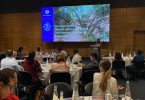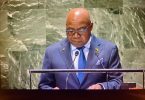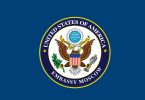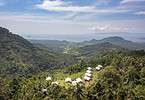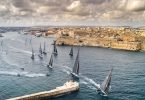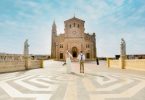TEHRAN, Iran – IIPT founder and president Louis D’Amore addressed delegates last month from 48 countries at the 1st International Tour Operators Conference in Tehran. The aim of the historic conference was to familiarize the high-level delegates with Iran’s tourism attractions and to explore possibilities of strengthening ties through tourism.
Louis D’Amore was among the 21 leaders eTurboNews brought to Iran for the conference. Here is his address:
“Members of the Iranian Tour Operators Association; the Iran Cultural Heritage, Handicrafts & Tourism Organization; distinguished guests; ladies; and gentlemen, it is indeed an honor and pleasure to be invited to address you here in Iran – home to one of the world’s oldest civilizations with historical and urban settlements dating back to 4000 BC; a land rich in history – rich in science and technology, the arts, literature, and culture; a land where more than two-thirds of the population is under 25 and, therefore, a land with a great future.
It was ten year ago, at the start of a Christian new year and the Islamic month of Ramadan, that President Khatami proposed a dialogue of civilizations, which in turn was adopted by the United Nations. It was proposed at the close of the 20th century, with the aim of leaving behind a century full of inequality, violence, and conflict. It was proposed with the intent of benefiting from the achievements and experiences of all civilizations and with a prayer that we begin a new century of humanity, understanding, and durable peace so that all humanity would enjoy the blessings of life. Clearly, President Khatami’s vision has not been fulfilled in these first years of the 21st century, but we have an opportunity with the first ITOA Conference to begin the dialogue anew with travel and tourism playing a key role in its fulfillment.
Since its beginnings in 1986, the UN International Year of Peace (IIPT) has been promoting a “higher purpose” of tourism including the key role of tourism in:
– promoting international understanding,
– collaboration among nations,
– protecting the environment and preserving biodiversity
– enhancing cultures and valuing heritage
– sustainable development
– poverty reduction, and
– reconciliation and healing wounds of conflict.
This “higher purpose” of tourism with its capacity to generate social, cultural, economic, environmental, and political benefits is increasingly recognized and has gained acceptance at the highest levels.
Vice President Mashaee, this morning, spoke of a new role for tourism – a role in global security. IIPT was born with a vision of making travel and tourism the “world’s first global peace industry” – an industry that promotes and supports the belief that every traveler is potentially an ambassador for peace and friendship. Our vision of peace is one that embraces peace within ourselves, peace with others – from our neighbors next door to our neighbors in the global village – [and] thirdly, peace with nature.
In the belief system of the Iroquois native people of North America, passed down from generation to generation for hundreds if not thousands of years, God created man to take care of everything else that God has created. Peace with past generations – honoring the legacies of our forefathers, their monuments and traditions – a dimension that is particularly [important] in Iran with your rich history and cultural heritage. Fifth, peace with future generations: when you consider the core essence of the concept of sustainable development, it is peace with future generations. And finally, peace with our creator, which brings us full circle to peace within ourselves.
IIPT was first to introduce the concept of sustainable tourism. In 1988, at our first global conference, “Tourism – A Vital Force for Peace” in Vancouver in 1988, four years before the Rio Summit on environment and development, we developed the first codes of ethics and guidelines for sustainable tourism [in] 1993 and conducted the first international study on “Models of Best Practice – Tourism and Environment” in 1993/94.
The IIPT credo of the peaceful traveler is increasingly distributed to travelers throughout the world, and more than 1,000 case studies of “success stories” have been showcased at IIPT conferences and summits. As a result, our most recent African conference [in] Uganda became the first country in the world to introduce tourism legislation in support of the UN millennium development goals, and more than 450 IIPT peace parks have been dedicated in cities and towns in regions throughout the world.
Ladies and gentlemen, humanity is currently witnessing and shaping the
most significant paradigm shift in human history – a paradigm shift of major demographic, economic, ecological, and geo-political dimensions. It took the entire history of mankind more than 150,000 years to reach a world population of 1.6 billion persons by 1900 – the start of the 20th century.
We will be adding that same number of people to our global family in the first 20 years of the 3rd millennium. Ninety percent of this growth will be in developing countries. While progress is being made toward poverty reduction in many developing and emerging economies, sub-Saharan Africa is sliding deeper into poverty. A robust global economy, combined with unprecedented population growth, is resulting in an ecological footprint that is more than one-third larger than what the Earth can regenerate in a given year.
As of September 16 of this year, humanity had already consumed the total amount of renewable resources that natural will regenerate during the entire year. This is referred to as “world overshoot day,” and that date is happening earlier with each passing year. The consequences of our accumulating ecological debt and pollution includes global climate change, species extinction, insecure energy supplies, water shortages, crop failures, and depleted fisheries. Sixty percent of ecosystems [are] being degraded or used unsustainably while we continue on this path of ecological decline and possible collapse.
The world military budget for 2008 is US$1.5 trillion – more than the GNP of any country in the world except seven. If my math is correct, this is equal to the total income of 40 percent of the world’s population who struggle to survive each day at the bottom of the economic pyramid – nearly $250 for every man, woman, and child in the world, when of the more than 6 billion people in the world, 1 of every 6 survives on US$1 a day or less and another 2 of every 6 on US$2 a day or less. One out of every 6 go to bed hungry, 1 of every 4 people on Earth never get a clean glass of water to drink, and 35,000 children die each day from preventable diseases – many of them from water-born diseases. Less than one half the world’s current military expenditures would be sufficient to end all the primary causes of poverty in the world; less than one half the world’s military budget would be sufficient to solve the crisis of global warming.
As early as 1960, Lester B. Pearson, then president of the UN general assembly and former Prime Minister of Canada, warned that “no planet can survive half slave, half free; half engulfed in misery, half careening along towards the joys of an almost unlimited consumption.” Neither ecology [n]or our morality could survive such contrasts. To meet the challenges presented by these and other global issues, we must collaborate in a manner unprecedented in human history. Clearly, a world at peace is a pre-requisite for the kind of collaboration required – a peace based on the binding force of mutual respect and an appreciation of our inter-connectedness as a global family.
This human journey of collaboration can only begin by first, building bridges of understanding between civilizations, cultures, and religions. Travel and tourism – the world’s largest industry – has a key role towards this end. Ladies and gentlemen, we have an opportunity in the next 10 years to be the leading industry in a major paradigm shift – a paradigm shift that has been struggling to be born; a paradigm shift to an environmental ethic that restores ecological balance in our common home, planet Earth; a paradigm shift that brings an end to poverty, together with a recognition of the human dignity of every person; and a paradigm shift that sees an end to war as a means to solving conflict, as it is only through a global family at peace with itself and a paradigm shift to collaboration at all levels and by all sectors of society, that we can solve the unprecedented global issues facing our one common home and our common future as a global family. Towards this end, I would like to suggest three areas of collaboration.
Earlier this year, IIPT launched “World Peace Tours,” the aim of which is to organize tours which exemplify the concept and principles of IIPT. Mr. Donald King, a member of IIPT’s board of directors, is spearheading this initiative, and we invite each of you who are tour operators to join us.
Secondly, at World Travel Market two weeks ago, IIPT announced its intention to mobilize support of the global travel and tourism industry for the Olympic truce in the months leading up to the 2010 Winter Olympics in Vancouver, Canada. We invite each of you to join us as well in this initiative.
And finally, IIPT will seriously consider the possibility of organizing a conference in Iran with the aim of promoting a dialogue among civilization through tourism in support of President Khatami’s proposal of 1998.
Thank you for your kind attention and God bless you all.”





